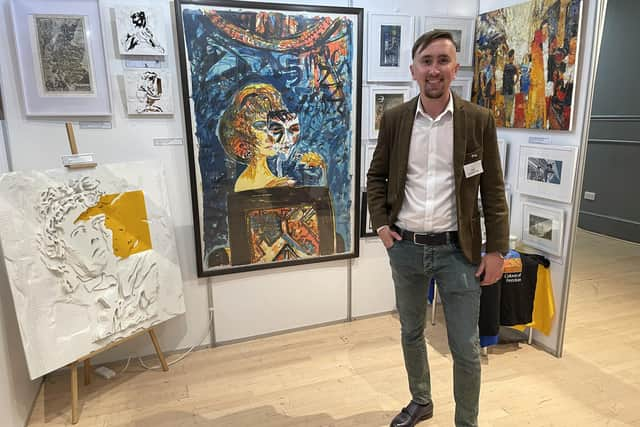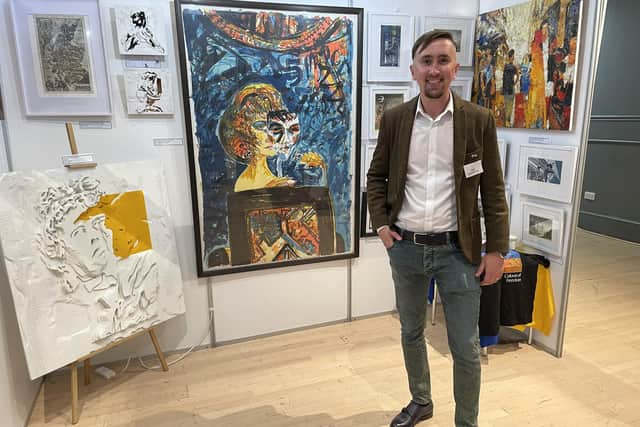Russian invasion of Ukraine: Ukrainians who have made a life in Scotland two years after the beginning of the war
When Anna Andriievska moved to Scotland in January 2022, she had no idea things were about to change dramatically in her home country.
A new mother, whose husband had been working in Scotland for five years, Ms Andriievska had applied for a visa to be able to join him. After a lengthy application process, she and the couple's four-month-old daughter Diana were finally granted permission to live in the UK and she left her home in Dnipro on January 24 that year – exactly a month before Russia invaded Ukraine – to start her new life in Stirling.
Advertisement
Hide AdAdvertisement
Hide Ad"When I look back at that time in the first month, I was so happy, between January 24 and February 24, I felt wonderful," Ms Andriievska says. "I was travelling and I was posting pictures of Scotland, sharing photos, I had a [social media] channel about life in Scotland. It was my first experience of living in another country so far from home. It was a really easy time."


In February 2022, neighbours in Stirling asked her about news they had read about tension between Ukraine and Russia.
"I didn't believe it, I told them it was just the newspapers talking and it would all be OK," she remembers.
Within weeks, Vladimir Putin had launched his "full scale invasion" of Ukraine.
"It was absolutely stressful, because I couldn't understand how I could help,” Ms Andriievska says.


Her family is in the south eastern Ukrainian city of Zaporizhzhia, where a battle over the nuclear plant there has been raging for much of the conflict.
"Since the war started, I have never felt as light or as happy as I did in that first month in Scotland," she says. "We’re always still thinking about this war. It is like a disease. It stays with you every day, no matter what you're doing, you are always reminded of it."
Now Ms Andriievska has launched a club to help other Ukrainian women navigate running businesses in Scotland, where around 25,000 Ukrainians are living since the onset of war, most of them on the Homes for Ukraine visa scheme.
Advertisement
Hide AdAdvertisement
Hide AdShe organises workshops and expert speakers to offer advice on everything from marketing products in Scotland, to legal and financial differences. Her members of the Ukrainian Business Women in Scotland Club, which last year held 35 events around the country, range from individuals selling craft and baking online, to an Edinburgh-based Ukrainian-style sushi restaurant and an interior designer.
"It is easier to start a business in Scotland in some ways," she says. "The information is easier to find and there is a lot of advice."
Ms Andriievska herself runs her own candle-making business, Anna Candles, where one of her designs – in the colours of the Ukrainian flag – raises money to support the war.
"When I am tired [of making the candles], I think about how people in Ukraine, about the soldiers and it keeps me going,” she says.
“But I miss my family and my friends. When we were planning to move to Scotland, we were going to go back home two times a year, for Christmas and summer, and now we can’t.”
Mykola Zinchenko was working in the 30-year-old family art auction house business founded by his father when the war broke out. Along with his wife and young daughter, the art dealer moved to Aberdeen.
He has since relaunched the Arsani auction house in Edinburgh, where he also runs the 24 Art Gallery in Leith. His family is still in Aberdeen, but he commutes between the two cities. He wants to bring Ukrainian art to Scotland, although acknowledges that in both countries, the local market is conservative.
"Most art collectors want local art,” he says. “Art collectors in Ukraine want Ukrainian art and it is the same here. We now have a mixture of British Scottish and Eastern European art at the gallery. We are trying to keep everything happy, bright and striking colours, because there is too much sadness around.”
Advertisement
Hide AdAdvertisement
Hide AdWhile he has brought a few favourite pieces to Scotland, the vast majority of the stock he had in Ukraine is still in storage there. However, he fears for its safety.
"Most of our stock is in Ukraine in some storage units, but we're not sure what will be tomorrow,” Mr Zinchenko says.
"We are now trying to plan for the future. We had a very good plan for the future, we thought about what we wanted to do in three, five, ten years. But when the war broke out, it was just broken. How could you build a plan when everything can change in one moment?”
For Yaroslav Shvets, a former member of the Ukrainian national Taekwondo team, moving to Scotland has given him an opportunity to share the sport he loves with people in his adopted homeland.
While living in temporary hotel accommodation after arriving through the Homes for Ukraine visa scheme in June 2022, he decided to pass the time by holding Taekwondo classes for Ukrainian children also living in the hotel.
"I have been teaching Taekwondo since I was 17,” says the 28-year-old, who is from Dnipro, where he has trained to compete for the national team in European and World championship competitions. "Here, I was living in a hotel with many Ukrainian children and I decided to teach as a volunteer to keep the children active.”
Shvets now teaches around 80 young people and has taken his students to major competitions, including the Scottish Open.
"Most of the children are Ukrainian, but there are also local participants,” he says. “I’m just trying to build our community and be active.”
Advertisement
Hide AdAdvertisement
Hide AdIn January 2023, his club, Temple Taekwondo, opened its own premises in Aberdeen.
"There are a lot of opportunities for Taekwondo here in Scotland,” he says. “It is not as developed as in Ukraine. In my city, there are 30 instructors of Taekwondo. But there are only 50 for the whole of Scotland.”
Schvet, whose brother is serving in the Ukrainian military, tries not to look too far into the future.
“I don’t know where I will be in five years,” he says. “If there was an opportunity to live a normal life in Ukraine and do what I love there, I would move back. But I love Scotland and I don’t know how many years, even after the war, it will take for Ukraine to return to normal life.
"I just focus on my life, day to day and just try to live my life.”
Comments
Want to join the conversation? Please or to comment on this article.
